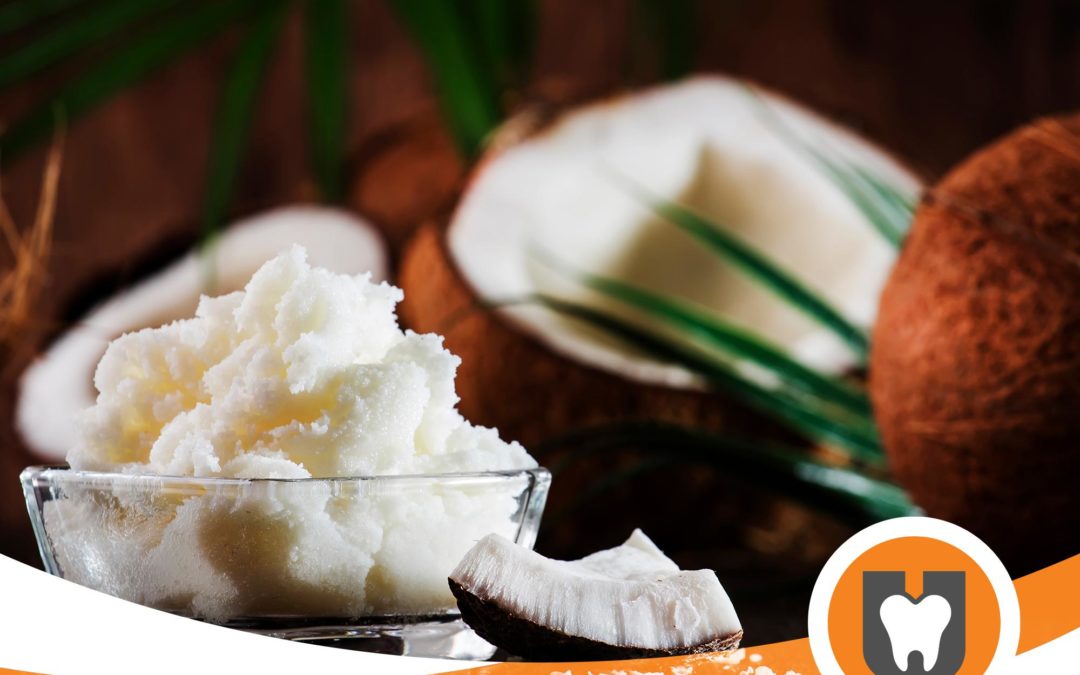A recent oral health craze called coconut oil pulling has become extremely popular on social media sites such as Facebook and Pinterest, as well as throughout segments of the holistic health community, but does it actually work? As you are probably aware, many DIY health crazes fall short of being a “miracle cure,” and so our Knoxville Dentistry practice wanted to deliver the facts and myths surrounding this oral hygiene routine to provide our current and future patients with the most up-to-date information. In this article, we examine how coconut oil pulling works, if it works, and what, if any, are the claimed oral health benefits.
What is Coconut Oil Pulling?
Coconut oil pulling is the simple practice of swirling a tablespoon of coconut oil in your mouth to promote oral health. While swishing with the oil, it should be pulled through the teeth so it can pass across your gums. The amount of time that one should swish with oil differs dramatically from one source to the next with instructions giving time frames as long as 20 minutes to just 60 seconds. Individuals who practice oil pulling have also suggested using other herbal oils such as sesame seed oil, olive oil, or sunflower oil as well. While thanks to the internet it has been gaining popularity, it is not a new practice and has been around for centuries. Many sources credit the origins of this alternative medical practice to traditional Ayurvedic medicine in India and Southern-Asia.
What are the Purported Benefits of Coconut Oil Pulling?
Oil pulling is said to “pull” toxins out of the mouth and oral cavities. Coconut oil pulling has been reported to remedy a host of oral health problems, including gingivitis, periodontitis, and halitosis. Claims have been made that oil pulling can strengthen teeth, gums, and the jaw, in addition to preventing tooth decay, dry throat, and cracked lips. Because the practice of oil pulling claims to eliminate bacteria in plaque, it also promises to reduce inflammation in gums. Anecdotal evidence even suggests that oil pulling can even whiten teeth. Oil pulling has been claimed to cure systematic diseases ranging from chronic migraines and chronic fatigue to allergies and asthma. Lastly, coconut oil pulling has even been suggested to aid in the prevention of heart disease.
Does Coconut Oil Pulling Work?
As with so many alternative medical practices, many people praise this oral hygiene practice; however, there is a substantial lack of high-quality medical research on oil pulling. The American Dental Association (ADA) has gone on the record by citing that there are no reliable scientific studies outlining the oral health benefits of coconut oil pulling, and therefore, does not recommend the practice.
In a 2016 medical journal, researchers conducted a systematic review of randomized clinical trials to examine the effectiveness of oil pulling on dental hygiene. The conclusion of the papers was the limited evidence to date from clinical trials suggest that oil pulling may have beneficial effects on oral health, but that future clinical trials should be more rigorous and better reported.
Should I Try Coconut Oil Pulling?
There are no know health risks associated with coconut oil pulling, and so while there is no evidence to suggest it, it cannot hurt you unless you have an allergy to coconuts. Additionally, you should avoid spitting the used coconut oil into the sink to prevent clogging that could result in an additional plumbing bill. At the end of the day, you may be simply wasting money on purchasing and using coconut oil. Individuals have reported an upset stomach as a side-effect from accidentally swallowing small amounts of oil.
Coconut oil pulling cannot and should not replace regular brushing, flossing, and rinsing. While some studies suggest that the practice of coconut oil pulling is equally effective as using a chlorhexidine mouth wash, the ADA recognizes the oral health benefits of rinsing twice daily with a mouth rinse to reduce plaque and gingivitis, or a fluoride mouth rinse to prevent tooth decay. When combined with brushing and flossing twice a day, rinsing helps kill harmful bacteria and promotes a healthy smile.
Top-Rated Dentists in Knoxville, TN
The ADA also recommends having your teeth professionally cleaned and examined twice per year as part of a complete oral health care routine. Contact the top-rated dentists in Knoxville, TN, at University General Dentistry today to make your next oral health checkup. You can reach to set an appointment online, by calling (865) 305-9440 for our University Medical Center Office, or by calling (865) 500-5700 to contact our West Knoxville Office.

